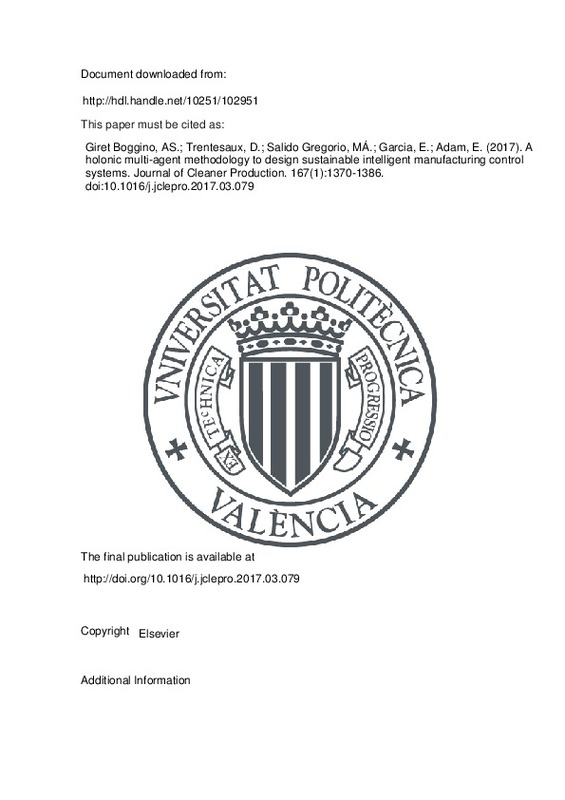JavaScript is disabled for your browser. Some features of this site may not work without it.
Buscar en RiuNet
Listar
Mi cuenta
Estadísticas
Ayuda RiuNet
Admin. UPV
A holonic multi-agent methodology to design sustainable intelligent manufacturing control systems
Mostrar el registro sencillo del ítem
Ficheros en el ítem
| dc.contributor.author | Giret Boggino, Adriana Susana
|
es_ES |
| dc.contributor.author | Trentesaux, Damien
|
es_ES |
| dc.contributor.author | Salido Gregorio, Miguel Ángel
|
es_ES |
| dc.contributor.author | Garcia, Emilia
|
es_ES |
| dc.contributor.author | Adam, Emmanuel
|
es_ES |
| dc.date.accessioned | 2018-05-31T04:20:59Z | |
| dc.date.available | 2018-05-31T04:20:59Z | |
| dc.date.issued | 2017 | es_ES |
| dc.identifier.issn | 0959-6526 | es_ES |
| dc.identifier.uri | http://hdl.handle.net/10251/102951 | |
| dc.description.abstract | [EN] The urgent need for sustainable development is imposing radical changes in the way manufacturing systems are designed and implemented. The overall sustainability in industrial activities of manufacturing companies must be achieved at the same time that they face unprecedented levels of global competition. Therefore, there is a well-known need for tools and methods that can support the design and implementation of these systems in an effective way. This paper proposes an engineering method that helps researchers to design sustainable intelligent manufacturing systems. The approach is focused on the identification of the manufacturing components and the design and integration of sustainability-oriented mechanisms in the system specification, providing specific development guidelines and tools with built-in support for sustainable features. Besides, a set of case studies is presented in order to assess the proposed method. | es_ES |
| dc.description.sponsorship | This research was supported by research projects TIN2015-65515-C4-1-R and TIN2016-80856-R from the Spanish government. The authors would like to acknowledge T. Bonte for her contribution to the NetLogo simulator of the AIP PRIMECA cell. | en_EN |
| dc.language | Inglés | es_ES |
| dc.publisher | Elsevier | es_ES |
| dc.relation.ispartof | Journal of Cleaner Production | es_ES |
| dc.rights | Reserva de todos los derechos | es_ES |
| dc.subject | Sustainability | es_ES |
| dc.subject | Multi-agent systems | es_ES |
| dc.subject | Holonic control | es_ES |
| dc.subject | Manufacturing | es_ES |
| dc.subject | Design method | es_ES |
| dc.subject.classification | LENGUAJES Y SISTEMAS INFORMATICOS | es_ES |
| dc.subject.classification | BIBLIOTECONOMIA Y DOCUMENTACION | es_ES |
| dc.title | A holonic multi-agent methodology to design sustainable intelligent manufacturing control systems | es_ES |
| dc.type | Artículo | es_ES |
| dc.identifier.doi | 10.1016/j.jclepro.2017.03.079 | es_ES |
| dc.relation.projectID | info:eu-repo/grantAgreement/MINECO//TIN2016-80856-R/ES/TECNOLOGIAS INTELIGENTES PARA LA RESOLUCION CENTRALIZADA Y DISTRIBUIDA DE PROBLEMAS DE SCHEDULING SOSTENIBLE EN PROCESOS INDUSTRIALES Y LOGISTICOS/ | es_ES |
| dc.relation.projectID | info:eu-repo/grantAgreement/MINECO//TIN2015-65515-C4-1-R/ES/ARQUITECTURA PERSUASIVA PARA EL USO SOSTENIBLE E INTELIGENTE DE VEHICULOS EN FLOTAS URBANAS/ | es_ES |
| dc.rights.accessRights | Abierto | es_ES |
| dc.contributor.affiliation | Universitat Politècnica de València. Departamento de Sistemas Informáticos y Computación - Departament de Sistemes Informàtics i Computació | es_ES |
| dc.description.bibliographicCitation | Giret Boggino, AS.; Trentesaux, D.; Salido Gregorio, MÁ.; Garcia, E.; Adam, E. (2017). A holonic multi-agent methodology to design sustainable intelligent manufacturing control systems. Journal of Cleaner Production. 167(1):1370-1386. https://doi.org/10.1016/j.jclepro.2017.03.079 | es_ES |
| dc.description.accrualMethod | S | es_ES |
| dc.relation.publisherversion | http://doi.org/10.1016/j.jclepro.2017.03.079 | es_ES |
| dc.description.upvformatpinicio | 1370 | es_ES |
| dc.description.upvformatpfin | 1386 | es_ES |
| dc.type.version | info:eu-repo/semantics/publishedVersion | es_ES |
| dc.description.volume | 167 | es_ES |
| dc.description.issue | 1 | es_ES |
| dc.relation.pasarela | S\331931 | es_ES |
| dc.contributor.funder | Ministerio de Economía y Competitividad | es_ES |







![[Cerrado]](/themes/UPV/images/candado.png)

